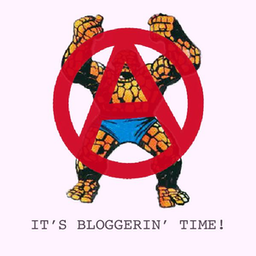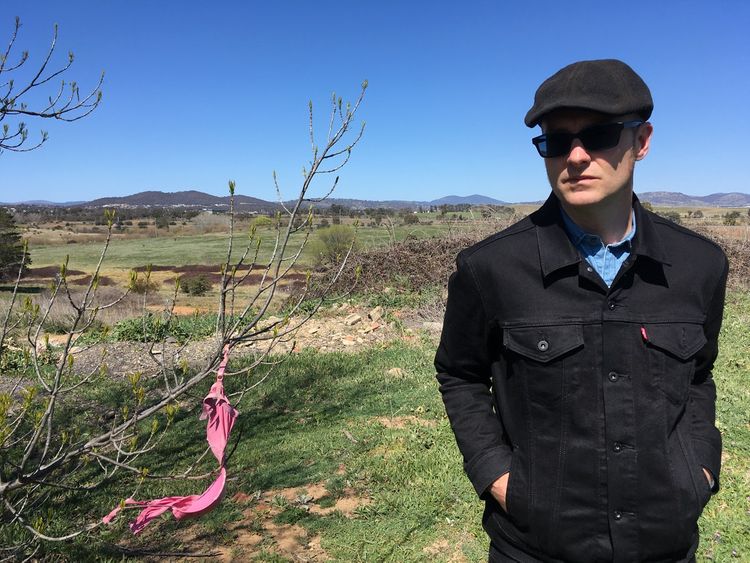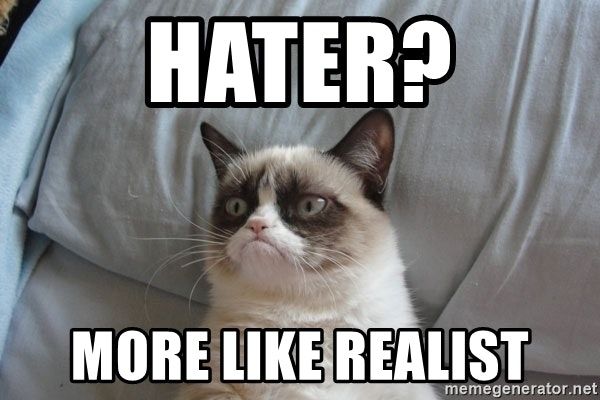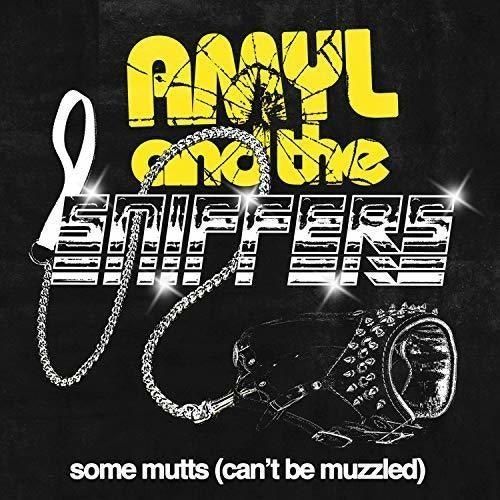I Get Drenched
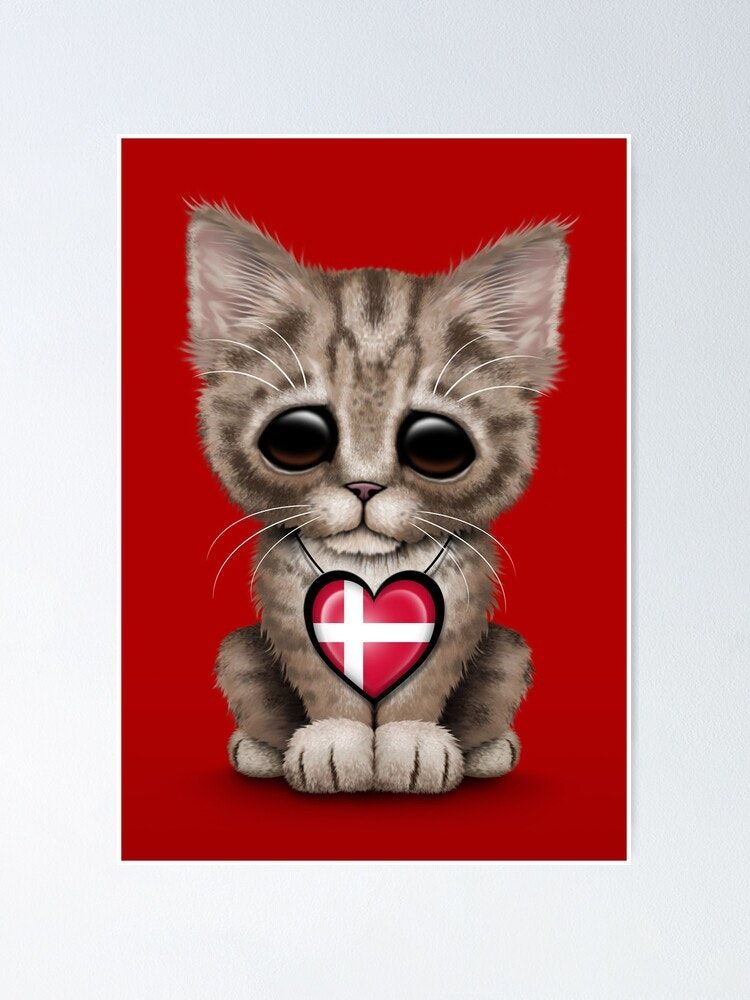
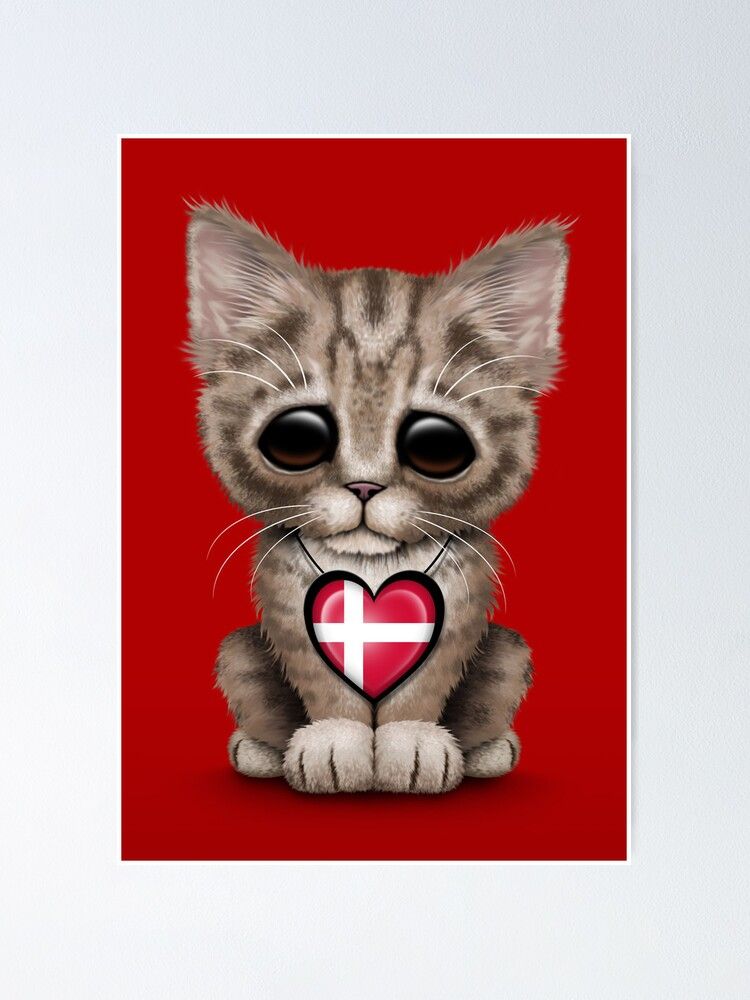
I’ve written about Iceage so much, I’m not sure I have any good words left. All my best pearls have been thrown down at the swine, mardi gras style. And to what end? Have I come any closer to solving the riddle of Denmark's second most beloved, existentially-minded princelings? I have not. To, just for kicks, continue the mardi gras analogy; Iceage’s shirts unbutton, but never seem to come completely off. And maybe I never will figure what separates this band from a million other pallid, flamboyant vampires suckling on rock and roll’s long-ago desiccated corpse. Maybe every essay I write and rewrite is doomed from the start to end in florid and masturbatory failure and humiliation. But, as January 7th marks the ten year anniversary of the initial release of Iceage’s New Brigade, the debut album of the band whose songs I have loved enough to name a substack newsletter after them, I owe it to our aging young heroes to at least try.
The story of Iceage, the band, is fairly straightforward. Post-toddler Copenhagen punks, as equally enamored with leftist squatter noise of bands like Sexdrome as the sketchy fencewalking of Oi! and UK neofolk esoteria, form a band in 2008 and make, as was weirdly popular at the time, cassette tapes. There are fabled performances of transcendent madness (and the occasional, later strongly disavowed, sieg heiling) and raw songs that spoke of teenage lust and rage and veered into black metal territory in both aesthetic and inaccassibility, songs that were as ambitious as they were heroicly idiotic. And didn’t the kids just love it. A simple tale. Tried and true. Josie and The Pussycats, beauty and chutzpah, with eventually more broken english apologies.
The actual release of New Brigade, however, is more like the origin story of all the great hero/anti-heroes, be they Odysseus or Wolverine; a morality tale of youthful dreams, betrayal, and gods indulging their whims...for the benefit of some and the ruination (or at least irritation) of others. And like The Odyssey and nine out of ten Wolverine stories, it’s more confusing than it probably needed to be.
The original pressing (the one that’s anniversary we celebrate) was a limited run on the Danish labels Escho/Tambourhinoceros. The band and label then reached out to Dais Records, the (then) small, singularly curated, arthouse punk-adjacent label run by Ryan Martin and Gibby Miller. As Martin tells me, the band and label “contacted us around the Fall of 2010, asking if we would be interested in putting out their first album in the United States. Like most cold call emails, it almost went straight to the trash bin.” Had Dais followed their initial instincts, maybe there’d be no Iceage and, if I even survived the absence of Iceage in my life, this essay would be about the ten year anniversary of the third Tapes ‘n Tapes album. But, for whatever fate-mandated reason, Ryan “and Gibby noticed a few ‘key’ things that grabbed our attention, primarily that they did a Sexdrome cover. My friend Mark McCoy had just released a Sexdrome LP a few months prior, which had really blown me away and allowed me to subtly start to enjoy hardcore again after a decades long hiatus. After one listen (of New Brigade), me and Gibby instantly got it. It was the only record that really made us feel young and alive again, without being a throwback or nostalgic. It was current (for the time) and exciting, two things that are rarely, if ever, found in punk... We agreed to do it, no questions asked.”
At the time, Dais was an old school Dischord-style “handshake as contract” label. They were also, counterintuitively for two men who’d made their bones within hardcore- the music genre most predicated upon the possibility and realization of interpersonal betrayal, open and trusting about label acquisitions. A few weeks before March 24, the official stateside release of New Brigade, Ryan was hit up by a pal on Facebook asking what new music he was particularly stoked on. As Ryan was ranting Iceage’s praises to anyone who would listen, he told his pal about New Brigade, going so far as sending a requested promo. Then he went to bed. Oh hubris. Oh sleep’s allowances. Oh cruel naivety.
Anyhoo. A few days later, Iceage’s management reached out to inform Dais that another American label would be handling digital/CD production and sales of New Brigade. And that American label (which Ryan Martin never mentioned to me by name… but I am a serious Iceage journalist) would be What’s Your Rupture, a label that had previously put out the excellent Long Blondes album and, coincidently I’m sure, was run by the same dude who’d hit Ryan up on Facebook. Ryan and Gibby weren’t thrilled with this development but, “We didn't fight it and said, since it was a handshake arrangement, they were free to do whatever they like. We were then guaranteed by everyone that this was only for CDs and digital. All vinyl would stay with Dais.” As anyone who has seen Hamlet or heard a single hardcore song knows, the human heart, not exclusively to the hearts of the Danes but not excluding them either, is fickle and mysterious.
“Album comes out and we hit the ground running with it,” Ryan says. “Sold out quickly and (we) decide to put in for a repress immediately. A couple weeks before the repress comes in, we are informed that the label who is doing the CDs and digital are also going to do a vinyl version, after we were guaranteed multiple times that Dais would still get the vinyl.”
“I must stress that all of these decisions were not coming from the band,” Ryan adds. Further taking pains to make clear that, while both he and Gibby were hurt at the time, they bore and bear no ill will towards the band (or Escho), Ryan says that they still love Iceage “to pieces” and adds that, in the Summer of 2011, “we find out that Iceage was coming to the United States for the first time ever to play a series of shows. At this point, Dais had been pushed out of the project but regardless, the band still reached out personally to us to hang out while they were in town. Had an amazing time hanging out with them in person, going out to breakfast in the East Village and, at their specific request, pointing out landmarks referenced in Agnostic Front lyrics. They were down to earth and personable, just wanted to hang out and not get stuck doing any of the lame industry bullshit that was being asked of them. We all discussed how things went down, even though the band had nothing to do with it and none of it was their call. I remember mentioning that none of that bs matters, just glad to be friends hanging out, eating pancakes and talking shit.”
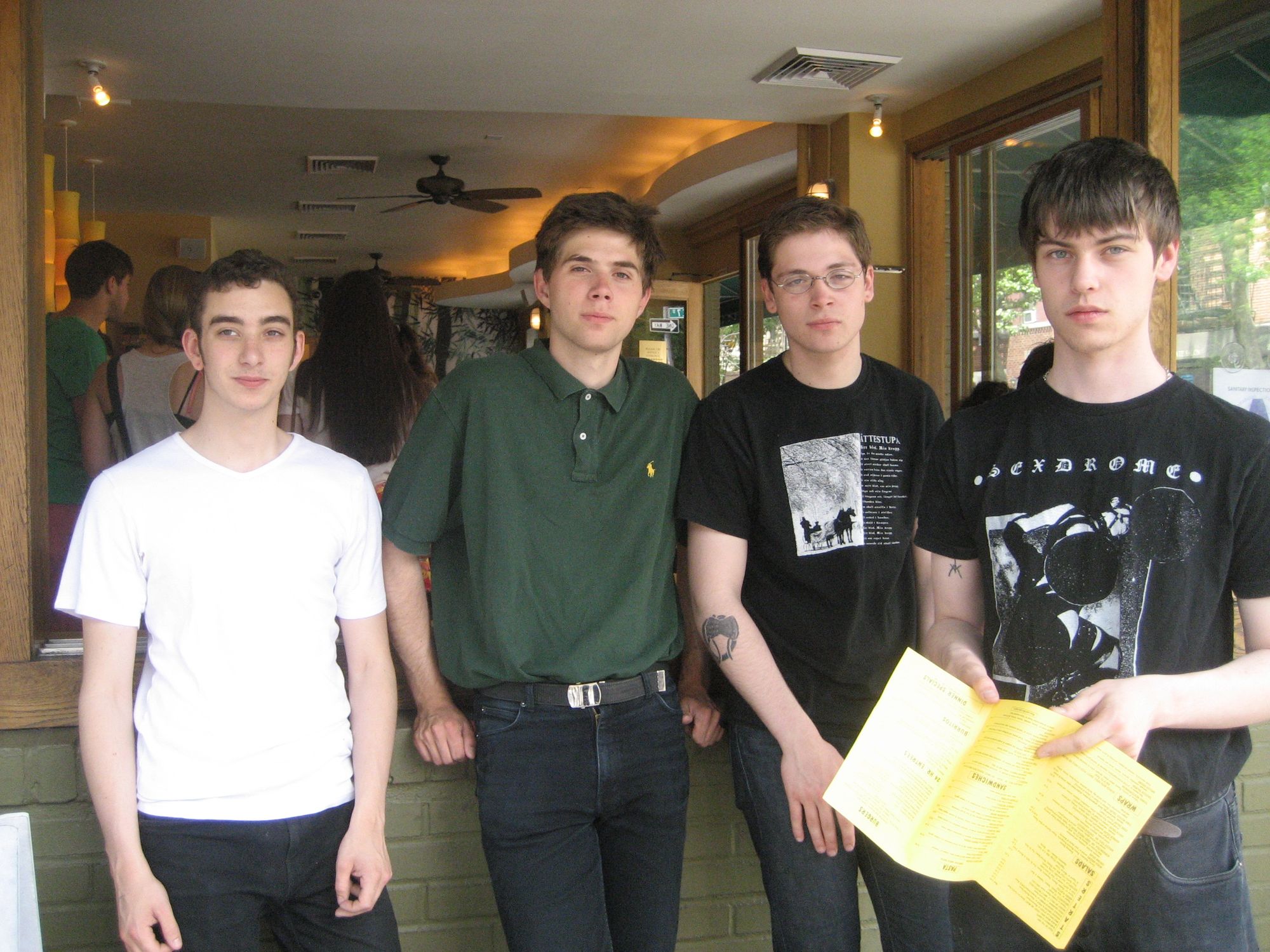
Ryan Martin asked that I tell the above story diplomatically. And the only way to do that, while still relating the facts, is to point out that, undoubtedly, the label that swooped in to take over the production of New Brigade has their own version of the story. (As do the Trojans and Sabertooth undoubtedly have their respective versions of the respective stories where they’re rendered as DIY vultures- or the historical equivalent thereof.) And the idea of our “indie” subcultures having ethics vastly different from the majors has always been largely a self-congratulatory myth. Few of the sharks are evil, they’re just doing what sharks do; acting real human. God knows that when Zohra and I have been ripped off, the underground hardly rose up as one in solidarity. It’s the sort of thing that hurts most when it’s done to you, and it’s hard to communicate that hurt in a way that makes anyone care. But, still, it’s always worth setting the historical record straight. New Brigade came out on Escho, then Dais, then What’s Your Rupture. And without Dais, it’s entirely probable that the album would never have come out in America. And god how we’d feel that loss, that hole in our souls and record collections, with no idea what caused it.
Or we’d all be thousandaires, rich from money saved from not buying cocaine or engraved Iceage flick blades. Who knows but the fickle, capricious gods of post-punk. Still, I’m erring on the side of gratitude towards Ryan and Gibby.
Iceage oh Iceage. They started as local Danish destructo-punk heroes, before crossing the ocean to play at being shambolic/problematic, small-stakes teen idols. Then, after all that drama, they signed to Matador Records to stake claim as standard bearers of short-haired death rock, long-haired Oi!, and bluesless cowpunk. Eventually, inevitably, Sky Ferrierra. Now, tickling almost thirty years of age, our nordic wolf pups have grown into a proper wolf brigade, one that howls at the same moon, historically and aesthetically speaking, as the twin poets of dissolution; Baudelaire and Shaun Ryder. Boy where does the time go. When Iceage came to America in 2011, older scene creeps had to buy the underage band beer, there was someone besides Donald Trump in the White House, and, on a personal note, my hair was amazing.
Setting aside my mourning for lost youth and styles now untenable, I imagine the ten year mark for New Brigade is especially jarring for Iceage fans who were as young as the members of Iceage were at the time of the album’s release (or, more realistically, a couple years older… Iceage’s initial American fan base was largely old enough to be interning at music publications and more largely old enough to drink in bars). Having one’s earliest big city pseudo-punk memories of debauchery tied to a boy band turning thirty can certainly make for a long stare in the bathroom mirror. I was already twenty-six when The Strokes’ Is This It came out but, even having experienced the cycle almost twice over now, the eternal hipster archetype of the Babe’s Journey still resonates. My heart goes out to all those who had age appropriate coke sex with an Iceager in 2011 and is now staring down the barrel of their thirties. Take comfort, still-young libertine, by album three all the Iceage songs are about your type as you are now. No Ellias alive wants to hook up with a twenty-year old. Youth isn’t wasted on the young but cheap suits and expensive stiletto heels definitely are.
Unless one’s slash fiction is exclusively about The Sound of Music, New Brigade isn’t even a particularly sexy album. Despite the music media’s attempt at the time to force Iceage into a post-punk paradigm, they were very much a hardcore band. While Ellias Rønnenfelt may have approximated a Curtis-ian croon, and the bass may have approximated a Division-esqe forward throb, the drums on New Brigade never once let up from an aggressive clatter that was wholly SST. And drums are the only instrument that matters. And, for all its thrilling speed (and despite the best efforts of any band that ever wore tight black jeans held up by white belts and half pudges), hardcore ain’t ever sexy.
Like the classic Love and Rockets comic panel that showed two adolescents, one a punk and one a hesher, finding common cause in Motorhead’s “Ace of Spades,” New Brigade was the rare album that aesthetes of divergent (or at least small difference prejudiced) subcultures could agree on. Punks, skins, death rockers, and hipsters alike all heard aspects of their respective DNA’s in Iceage’s racket. Punks, like the nuke york savants in Crazy Spirit, saw drunken passion played past the limits of competence. Skinheads, at least the few who were open to non-explicitly skinhead music, dug the strange martial aspects of the music itself, not to mention the anti-social posturing that came off as fence-walkery (again, until it was- by career and moral necessity- clarified as leftist). Goths and Death Rockers heard the searching for transcendence in Rønnenfelt’s esoteric lyrics and earthly moans, saw the potentialities for Rimbaudian oblivion in the after-show, the pre-show, the doomed-to-chaos show itself. Hipsters read about Iceage in Stereogum, heard the Joy Division they wanted to hear and, like all the aforementioned cliques, related deeply (or aspirationally) to the band’s sculpted cheekbones and alternative-Timberlake hairdos. Of course the punks, never big on sharing, checked out early. Even though New Brigade would never have caught on without Maximum R’n’R’s initial raves, by the time Iceage played their second American show, with Goosebumps at the DIY Mecca 538 Johnson, there were far, far, far more punks performatively skipping the band’s set from the hallway then there were watching Iceage play.
(To be clear, the punks who bailed on Iceage were not the musicians. Bands like Crazy Spirit, Goosebumps, Perdition, and White Lung continued to play and tour with them. Many like-minded bands would even walk parallel paths with Iceage over the years; growing their hair out- metaphorically and literally- as the generational ritual of Punks Discovering Cowboy Shirts, slide guitar, and Hard Drugs repeated itself again. Every bell ringing is Jeffery Pierce getting his angel wings. Or Mike Ness red winging a lost angel with an oversized Betty Page tattoo.)
For myself, then an already aging hipster, and friend to a friend of all guitar-centric subcultures, New Brigade was a true godsend. I mean, for the first time in years feeling that ineffable raw pleasure/ache new music had supplied as a teenager, I think I may have actually thanked God for Iceage. Listening to New Brigade on repeat was a return to the swooning sensation I’d long ago accepted I would, for the rest of my life, only get from drugs and/or being in love. Not that I wasn’t OK with either of those sublimities- fiending for either in equal measure- but it was awful nice to get back to a much-missed third option. The music of New Brigade was powerful and vague enough to put myself within it, to inhabit the songs as more than a consumer or interested dilettante. A new muck to roll around in; it doesn’t come along as often as all those personal essays masquerading as reviews might lead you to believe. Or maybe it does to you. But not me. As a music fan, I’ve put my fork in a lot of sockets, lucky to occasionally get sparks. But, for reasons I still can’t explain, New Brigade got the electricity in my veins where I needed it. Made my hair stand up, even through the pomade. And, at the time, I wasn’t exactly stingy with the product.
It’s worth trying to figure out why that is; why, at the age most aging hipsters either fight a losing battle of affectation; Wu in the streets and Dü in the sheets, or just settle into straight up John Cusak cosplay, I somehow found a new band that made me ache the way Courtney Love’s ex’s second album made me ache all those twenty years prior. Well, maybe it’s not worth figuring out, but ten years is ten years. Posterity will not hook itself.
As with Nirvana’s Nevermind, no matter how many times I’ve paced the floor, listening to the album back to back, over and over, I couldn’t sing you an entire song on New Brigade if you paid me. This is a sign of quality. Lyrical snippets are always better, truncated earworms almost nonsensical out of (and occasionally in) context. Rock lyrics are not books. They don’t have to be good from cover to cover. They just have to seem good as they speed by. Rock and Roll, at least one strain of it, is all about repetition, habit, and aesthetic (cool). Like smoking cigarettes but dumber and sexier. “I’m on a plane/I can’t complain” doesn’t have to be anything but simpleminded on the page. Like “I thought I had it/ but that time/ it was just a broken bone,” when the phrase is rasped out by a bad boy with bangs, the hint of secret knowledge carries over. And like Nirvana, when the singer started writing songs in complete sentences, the project didn’t suffer necessarily (neither Nirvana and Iceage’s third albums suffer for the coherence of their respective songs of aristocratic complaint)… but the retreat from automatic style writing can feel a bit like a refusal of divine madness. Or maybe when the songs no longer vie for land speed records, the singer gets to say what they actually meant in the first place. Tomato Tomahto.
It inevitably comes back to speed. New Brigade’s speed is what hooked me, hooked the punks, disappointed those who wanted a new Joy Division. Too fast to be dance-punk, with the Andy Gill slash riffs chipmunked into squeals accordingly, New Brigade sounded like a reversal of the canonical (if incorrect) chronology of punk to post-punk. What if, instead of punks slowing down, discovering dub and/or commerce, P.I.L. and Gang of Four had come first? And then a bunch of aryan pimple poppers heard Death Disco or whatever and said, what if we picked up instruments for the first time and played those songs just as fast as our sticky little fingers can manage? Poor goons heard Warsaw after Unknown Pleasures and thought, “yes. This is better.”
As a punk record, New Brigade also embodied a number of hardcore traditions; Los Angeles arthouse chaos, Boston militant snarework, Chicago high pitched squall, Cleveland death-fix fixation, Finnish willful incomprehensibility to outsiders-dom, Japan’s blurring of genres and use of unfortunate imagery, etc. Despite their affection for Agnostic Front, I don’t hear much New York Hardcore though. Which is fine. Not everybody looks good in sportswear.
While the album’s blister burn may have turned off blog readers hungry for the next Interpol, it didn’t dissuade those who wanted a new Strokes. At least not the ones who understood The Strokes actual talent; the ability to instill horniness into a visit to the famously antiseptic Mercury Lounge. We’re not supposed to talk about attractiveness of bands anymore; presumably not until that game is no longer weaponized against the Boy Bands made up of ladies. But The Strokes wouldn’t have been the Strokes if they’d looked like Guided By Voices, and neither would Iceage. Be The Strokes I mean. They’d probably still be Iceage, just still signed to Dais. But the little girls, and little boys, and little non-binaries, all understood that there’s many reasons to go out at night, and that “just the music, man” is only one of them. They understand that, even if you’re not looking to hook up, you can still go to shows to engage in a collective yearning, and one that doesn’t always respect the borders between heart and mind and other territories. Basically, the fans who inhabited this Iceage/Strokes/All Other Black-Clad-Boy-Bands overlap understood that the lyrics of “Total Drench'' worked better as double entendre than whatever reference to existential disappointment Elias Bender Rønnenfelt intended them as. Pop that sea, young Iceager. Fire to the fur, indeed! The sewers aren’t the only place where there’s a sluice, knowwhatImean!? Anyway. You get the point. Sorry to gross you out. Just saying that if pop didn’t offer something the Bible doesn’t, if rock and roll cheekbones were something to be studiously ignored in the name of ideology and egalitarianism, Lucifer wouldn’t be the hit show it is. That’s all I’m saying.
Or I don’t know what I’m saying, exactly. For those of us who make our living clinging desperately to youth, New Brigade made it feel slightly, temporarily, less desperate. Or at least desperate in the “we’re desperate/ get used to it sense” as opposed to “we were desperate, now we’ve gotten used to it.” Something like that. Maybe I’ll try again in another ten years.
Even Ryan Martin, the man who brought Iceage to the American audience, shares my happy confusion as to why New Brigade works as well as it does. When I told him that this essay would be trying to figure out why this album, that hardly reinvents the wheel, not in any way I can put my finger on at least, should mean so much, then and now. He agrees with the assessment/question, saying, “This album was nothing ‘new’ on the surface, but somehow the way they pulled it off was unlike anything I'd ever heard. Made me feel 16 again,” And here I think is where Ryan nails it, “but I never heard anything like that when I was 16...There was nothing nostalgic about it. Nothing that was trying to emulate some previous era. It sounded like the day you put it on.”
Ryan ends his attempt at explanation with a simple, “Hard to explain.” It’s safe to assume that, in saying “hard to explain,” Ryan is not making a reference to The Strokes’ song (I don’t think he’s a fan), but so what. Because even if the differences between the bands are glaring (one was actually popular, one stayed good past the first album), the thread between the two does reassert itself; music by and for the too young, striking right into the heart of the too old. Even as the the boys of Iceage, who truth be told were dressing and playing like extras in a Concrete Blonde video by the time they hit their twenties, approach the actual age of being some other baby band’s Interpol, even as the nostalgia market cycles have accelerated to the point where it’s no longer clear if new bands are influenced by original bands or the reiterations from the most recent decade revival, even as Iceage actually influenced literally nobody (the ripoffs missing the point and just sounding like pale-er Joy Divisions or, later, Gun Clubs), even as the rest of us cosplay as the dying suns in our own cosmologies, distracted by the actual growing old and dying of the actual people around us, New Brigade somehow retains its ineffable spark. As Ryan says, the record sounds exactly like the day you put it on. It also sounds like being young, dumb, and, even as time fills you full, still hungry. And it sounds like the sex beat need to hurl one’s skinny frame through a wall, leaving a situationist-slogan shaped outline where your body crashes through, skinny Kool-Aid Man style. Also, it sounds like need for speed, born to lose, and what we do is secret all poured into the jungle juice blender; like adolescent grievance that never goes away, the kind that there’s just no help for. Certain aches are timeless, and I say that as neither compliment nor criticism, just that some urges just don’t go away. Without bringing any no future shenanigans into the discussion, celebrating New Brigade’s anniversary is disrespectful to its chief virtues; a vigorous, wanton fidelity towards rushing forward.
Thanks for reading! Please share and/or subscribe!

